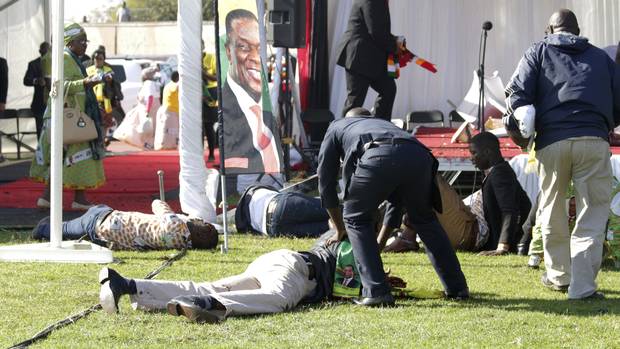Investigations into the White City Stadium bombing in Bulawayo is turning into a ‘cold case’ as there are no leads pointing to potential arrests almost 17 months after the blast which killed three and President Emmerson Mnangagwa narrowly escaping.
Dozens of people, among them Vice President Kembo Mohadi and Zanu PF chairperson, Oppah Muchinguri were injured from the explosion during a Zanu PF rally in the build-up to the 2018 harmonised elections.
In an interview, former war veterans’ minister, Tshinga Dube lamented that the explosion was still a mystery as no one had been arrested, further suggesting that security was lax on the day in question.
“There are a lot of things that remained a mystery and if such things can go without any conclusion why can’t they be repeated? They will be repeated because people will know they can get away with that. I think there’s something that we have to actually seriously look at,” he said while responding to questions from Bulawayo journalists Monday.
Dube, soon to officially launch his biography, said he wrote about the White City incident in the book where he makes reflections about the bombing.
“The problem that happened at White City was very serious and in other countries, definitely security forces wouldn’t have been spared. In other countries, the head of security, head of military intelligence, head of police and so forth would have been fired but it’s not our culture in this country,” he lamented.
The former war veterans’ minister, also an ex-ZIPRA cadre, wondered how up-to today the investigations have been inconclusive.
“Things just went as they did when we were supposed to find out who actually carried out that mishap because its target was to kill the president. Now if a president’s life is threatened and we just say life goes on as you see, it’s not right,” Dube said.
He also noted that no one had been arrested for Mnangagwa’s alleged poisoning, which took place in August 2017 when he was attending a Zanu PF youth interface rally in Gwanda, an indication that the country’s security was inefficient in investigations.
“For instance, (what if he) later on fell in the hands of those who poisoned him. The president went for treatment and life went on. Nobody was named to be responsible, it can’t be a mystery forever. There must be something unless our security sector is not up to its guard,” Dube said.
The former minister said since the bomb was “always in my mind” he had written about it in his book.
He recalled how he was sitting on the podium with his wife, preparing to go minutes before the explosion occurred.
“(Retired army general and vice president, Constantino) Chiwenga came walking and he stopped to greet my wife and just as he finished greeting her, boom, it went off. If Chiwenga had moved and had not stopped for that meeting, he would have been a casualty. The bomb also missed the president by a whisker. The fellow who was accompanying President Mnangagwa, his guard was blown completely dead,” narrated the former war veteran’s minister.
Dube said he still had a lot of questions till today about that incident.
“I’m told the investigations are going on but there are questions to answer. How that happened in broad daylight and how we are unable not only to apprehend but to identify the culprit, so it leaves us with a lot of questions,” he said.
After the July elections last year, Mnangagwa while addressing Zanu PF candidates who were elected into office, he said people behind the bombing we now known and would be dealt with soon after the electoral processes were over.
However, in an interview with CITE, Deputy Chief Secretary to the President and Cabinet in charge of Presidential Communications, George Charamba, confirmed no arrests had been made.
“I am not privy to the security operation as I am a mere civilian but in any case if something had happened, I would have known. We have to look at the capacity to investigate, capacity to place an arrest so no one has been arrested so far,” said the presidential spokesperson.
Early this year, reports said a crack team from the Criminal Investigations Department (CID), which included 10 detectives from Harare, was withdrawn from the probe in December.
The investigation also involved the Central Intelligence Organisation (CIO) and Military Intelligence, but were said to have maintained a passing interest raising beliefs that the crime might never be solved.
It was also reported that bomb experts from Belarus briefly joined the investigation and concluded the explosive device was an offensive fragmentation grenade made in Russia.
They projected that it had been lobbed in Mnangagwa’s direction from a distance of about 17 to 20 meters.
Two men, described as drifters who sometimes worked as commuter omnibus touts, were arrested and later released after it was established they were not connected to the explosion


